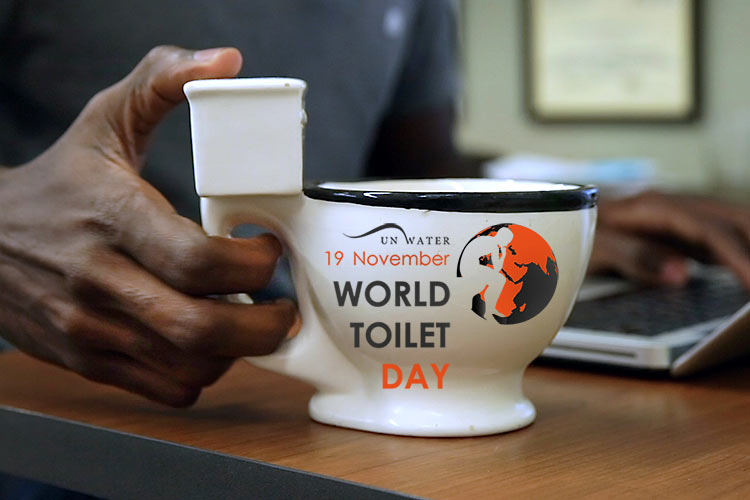Three UN experts, one common view on equality and dignity when it comes to sanitation UN World Toilet Day – Wednesday 19 November 2014
GENEVA (19 November 2014) – “Equality and dignity have a very concrete meaning in the lives of billions of people when it comes to sanitation,” the United Nations Special Rapporteurs Catarina de Albuquerque, Rashida Manjoo and Maud de Boer-Buquicchio said today on the occasion of UN World Toilet Day.
“Women and girls in particular experience the indignity and risks of a lack of adequate sanitation in multiple ways”, the UN experts on water and sanitation, violence against women, and sale and sexual exploitation of children pointed out. Why?
Catarina de Albuquerque
UN Special Rapporteur on the right to water and sanitation
“Wherever I go on country mission – and I have been to 15 very diverse countries all over the world – I meet women and girls who face obstacles in exercising their right to sanitation.
In many countries, social or cultural norms prevent girls and women from using the same sanitation facilities as male relatives, for instance the father-in-law, or prohibit the use of household facilities on the days women and girls menstruate.
More generally, menstrual hygiene management presents an enormous challenge for many adolescent girls and women. I have made it a priority during my mandate to always enquire about menstrual hygiene, and I have found that talking about menstruation is taboo all over the world.
Menstruating women and girls are stigmatized in many cultures, they are perceived as dirty, impure and polluting. Due to the low priority of menstrual hygiene from policy-making to decision on household budgets, many girls and women face very practical difficulties in managing their menstruation. They fear smelling or staining and are not able to attend school or work.”
Rashida Manjoo
UN Special Rapporteur on Violence Against Women
“According to 2014 estimates, more than one billion people still practice open defecation and studies from very diverse countries reflect the risks women and girls face when doing so.
Women and girls are disproportionately affected by harassment, assault and sexual violence when relying on public toilets or when forced to practice open defecation, largely due to the lack of access to a latrine at home or safe latrine facilities in the public sphere.
Ensuring access to sanitation in the home can address the problem of violence against women and girls in the public sphere. Access to sanitation in itself is a human right but it also forms part of the preventative tools in the elimination of violence against women and girls.
In numerous countries cases of rape committed while victims are seeking access to sanitation outside their homes have made headlines repeatedly. Women and girls should feel safe in public spaces in those cases where they must leave the home to use a latrine.
Access to safe sanitation facilities is also essential because it brings enormous gains for public health, for bodily integrity, for safety and comfort for all.”
Maud de Boer-Buquicchio
Special Rapporteur on the sale and sexual exploitation of children
“In spite of the increased focus on ensuring adequate sanitation, women and girls are frequently prevented from using these facilities in the household due to prevailing social, cultural and behavioral norms.
A prevailing climate of discrimination, insecurity and violence, combined with lack of access to adequate sanitation facilities for girls and women in public spaces, enhances considerably the risk of being subject to acts of sexual violence.
Unfortunately building toilets in the home alone does neither address the root causes, nor will it be sufficient to eradicate sexual abuse. When girls are victims of sexual violence, it can be the beginning of a downward spiral towards sexual exploitation, as victims are confronted with social tolerance and impunity for sexual crimes, and are rejected by their own family and community.”
A common appeal
“We do need to ensure access to sanitation on the basis of equality, but we also have to work toward building a society that fights abuse and violence against women and girls in all spheres of life, and that values women and girls on the basis of equality.”
Catarina de Albuquerque is the first UN Special Rapporteur on the right to safe drinking water and sanitation. She was appointed by the Human Rights Council in 2008. Ms. de Albuquerque is a Professor at the Law Faculties of the Universities of Braga, Coimbra and of the American University’s Washington College of Law. She is a senior legal advisor at the Prosecutor General’s Office. Learn more, visit: www.ohchr.org/srwaterandsanitation
Rashida Manjoo is the current UN Special Rapporteur on violence against women, its causes and consequences. She was appointed by the Human Rights Council in 2009. She is a Professor in the Department of Public Law of the University of Cape Town and is the former Parliamentary commissioner of the Commission on Gender Equality in South Africa. Learn more, visit: http://www.ohchr.org/EN/Issues/Women/SRWomen/Pages/SRWomenIndex.aspx
Maud de Boer-Buquicchio is the UN Special Rapporteur on the sale of children, child prostitution and child pornography since May 2014. Throughout her career, as Deputy Secretary General of the Council of Europe and Deputy Registrar of the European Court of Human Rights, she has focused her work on the fight against discrimination and violence, and spearheaded the adoption of legal instruments and programmes to eliminate sexual abuse, violence and exploitation of women and children. She is the President of Missing Children Europe. Learn more, log on to: http://www.ohchr.org/EN/Issues/Children/Pages/ChildrenIndex.aspx






Comments